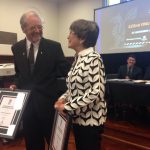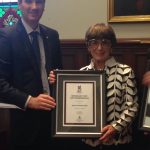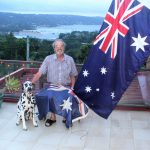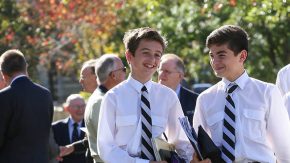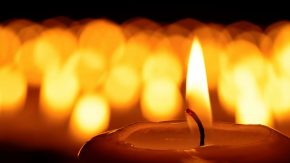Congratulations
At the 2017 ONU Annual General Meeting it was with great pleasure that the ONU President, Alex Baykitch AM (ON 1982) granted Mr Clive Woosnam OAM and Mrs Helen Woosnam OAM Honorary Life Membership of the ONU.
It was an honour to have them both in attendance to receive their membership. Mr Woosnam OAM was a staff member of Newington for 35 years. Joining the staff as a Geography teacher in 1970, he had filled many roles at Newington, including as Head of the Boarding House (a role that he shared with Helen), Housemaster, Master of the Lower School, Registrar, Alumni Manager, Master in Charge of Rugby, plus coach and referee, Athletics and Cricket coach, editor of the New Focus magazine, as well as having charge of the archives, leading rugby tours and — described at his farewell dinner as ‘The Welsh Wizard of Words’ — compering numerous College events. He was subsequently awarded the Medal of the Order of Australia (OAM) in 2009, for his services both to education and to the broader community through his roles in culture and musical societies, notably the Sydney Welsh Choir. In receiving this honour, he joined his wife Helen, who had been awarded the OAM in 2000 for her work with children with disabilities and with Children’s Week. In recognition of their long association with Newington’s alumni community, Clive and Helen are now Honorary Life Members of the Old Newingtonians’ Union.
Rod Bosman (ON 1978) Director of Community and Development is in regular contact with Clive and Helen. Sadly, Clive is in late stage pancreatic cancer and it could take his life at any time. But to see him or speak with him, you would never know. This letter perfectly sums up his positive spirit and outlook on life. It is with Clive’s permission that we share with you a recent letter from him
TERMINAL CANCER LEAVES PLENTY TO LAUGH AT
When the invitation to the palliative care Christmas party arrived, it didn’t take me too long to accept. After all, I reasoned, this should really be a memorable occasion: the last such event we would probably ever experience. I arrived at the rooms in the hospital with my wife Helen to find about 30 people there, and a band with three electric guitars, a keyboard and drums. I looked around at the gathering and was suitably impressed.
“They don’t look too bad for palliative patients”, I remarked to Helen, “except that poor fellow over there – his days are certainly numbered. And that woman in doorway is living on borrowed time”.
I decided that there were three or four more in the same position but the group as a whole seemed surprisingly healthy. Surprising, that is, until the MC thanked every one for coming, especially the volunteers, nurses and admin staff, who all raised their hands as directed when being thanked. I suddenly realised that I was the only patient there. And the poor sick souls seemingly at death’s door were people employed to help me.
I always imagined that if I were given a few months to live I would be totally depressed and incapable of appreciating other people’s humour, let alone be able to think up humour of my own. Yet, when the moment came in late December 2016 that the oncologist told me I had two months to live untreated, a median figure of six months to live with treatment and a one in twenty chance of lasting two years, I accepted his words with no sense of surprise and have felt not a whiff of depression since that day.
Perhaps it’s because I didn’t believe him, as I don’t feel ill in any real way and certainly don’t feel that death is just around the corner. Perhaps it’s because, if I’m wrong, and death suddenly stares me in the face, I think I can handle the situation and accept my fate without too much complaint. Perhaps it’s because I really have found comfort or humour in my situation.
Until December 2016 I did my daily crossword to stave off Alzheimer’s and keep my brain fit. Now, theoretically, I don’t have to worry about my brain in ten or twenty years’ time – I can do my daily crossword simply because I enjoy it. Moreover, all sorts of physical ailments can now be ignored. I won’t bother with my imminent colonoscopy, and I won’t need to wait for the Tinnitus hotline to answer – it can just keep ringing.
Chemotherapy does pose some side effects but even they can have a positive side. My taste buds have been deadened by the treatment. It means my porridge needs more sweetener and some salt to provide any flavour, but my rough red quaffing wine now tastes as smooth as Grange Hermitage! And the 26 kg of my former weight removed by my voracious tumour means that I can walk further and faster than I have for years, much to the delight of my Dalmatian Ozzie, who comes on my 7km morning walk to feed the fish in Pittwater. What’s more, I can eat as much as I like, or my diabetes will allow.
One delicate problem I haven’t solved is that of stomach gas. With my pancreas totally non-functional and a radioactive isotope implanted in it I have become a significant contributor to global warming. It is also potentially very embarrassing socially, and my well-behaved dog gets a lot of peculiar looks from friends who haven’t worked out the correct source of the aromas coming their way.
Chemotherapy hasn’t been in any way unpleasant, but I must admit that radiotherapy has been quicker and more enjoyable. Though there is no heat on the skin, the whole process is reminiscent of lying on the beach, looking up at the white fluffy clouds in the blue sky moving across the ceiling. I have suggested that the hospital play a CD of breaking waves and the cries of seagulls to complete the illusion. Were the treatment not in midwinter I would have arrived at the hospital clad in swimming togs and clutching my towel.
At least I now know where to find the radiotherapy unit at RNSH though it is not mentioned outside or inside the lifts. I’ve discovered that all I have to do is follow the signs to the Mortuary in the basement, and there it is!
Clive Woosnam



